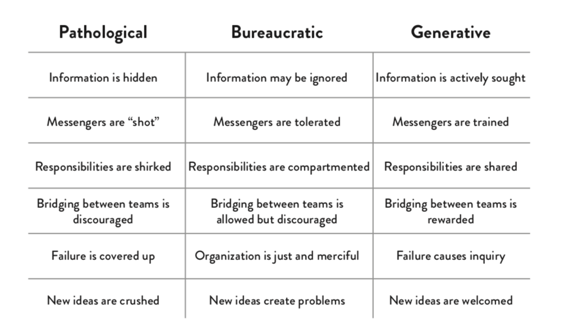Team Culture
Research shows that team culture is not only strongly correlated with company performance, it is also a strong predictor of job satisfaction. A high-trust culture is important for creating a happy working environment and a high-performance organisation.

Having a culture of collaboration where people feel safe to share their views and work across a diverse group is a must for a successful organisation. Research shows that team culture is not only strongly correlated with organisational performance, it is also a strong predictor of job satisfaction.

The results are clear: a high-trust, generative culture is not only important for creating a happy working environment - it is the foundation for digital leadership and of creating a high-performance organisation.
Changing the way people work changes culture - the way to change culture is start by changing what people do, and to help them understand why that change is necessary.
Some steps that you can take to change behaviours include:
- Create cross-functional teams and let each team member share the responsibility creating and maintaining a product.
- Work across silos. Notwithstanding the creation of cross-functional teams, there may still need to be some functionally focused teams. Encourage colleagues to grab a coffee or move desks and sit next to them for a week or so to gain understanding of what others do.
- Remove blame. By removing blame, fear is removed and that enables individuals and teams to talk about problems and solve them. By extension, actively encourage taking considered risks and not censuring any failure. Learning what works and what doesn't, and doing so efficiently, is essential to delivering value to the end-customer.
- Share risk and responsibility. An improvement in collaboration from sharing responsibility has the positive benefit of reducing risk. The more people who have an interest in the end-outcome, the better the steps on the way to that outcome.
- Encourage experimentation. Releasing people from habitual pathways and repetitive tasks will generate unimagined value. Give team members the freedom to explore new ideas. This could be 1 day a week to explore a topic of interest or experimentation, or an internal hack day.
Taking any or all of these steps will significantly contribute to employee engagement.
Next: Flow and Feedback
Create, shorten and amplify feedback loops so that learning is fast. Continually experiment in order to learn from mistakes. Make sure that work flows in small, easily completable packets towards the customer.


